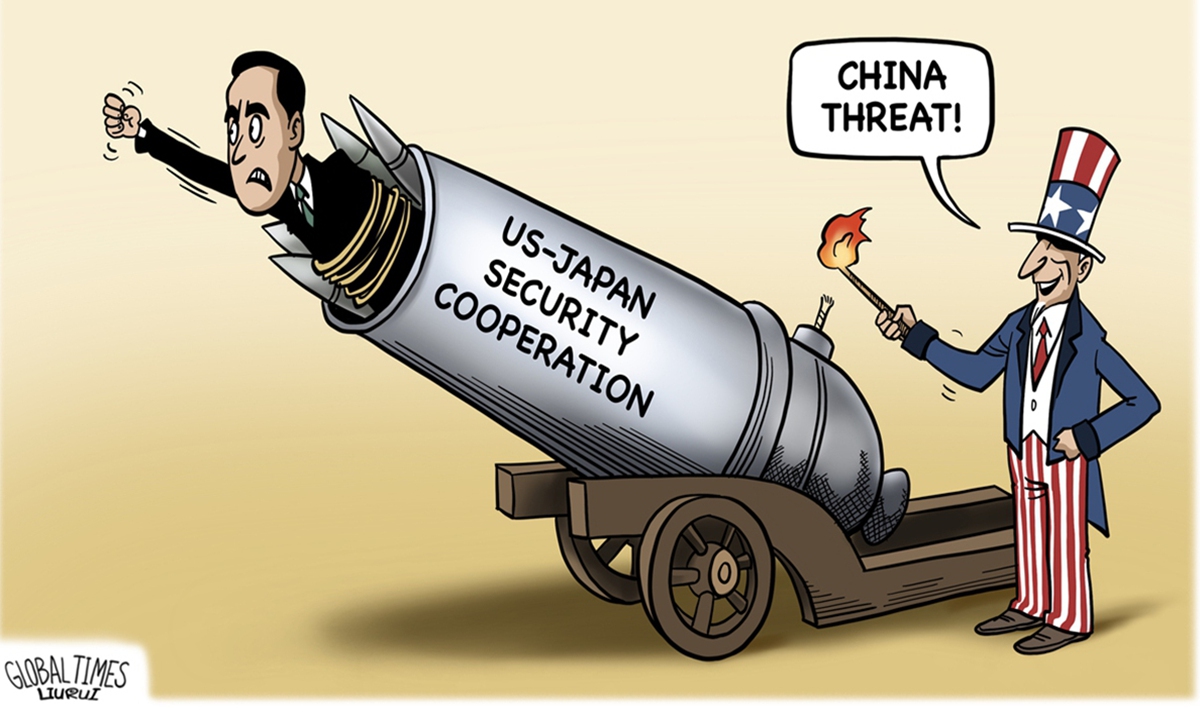
Illustration: Liu Rui/GT
Japan's recent foreign policy "has focused excessively on the US and overstated the threat of China," a panel of experts on international relations said on Tuesday, calling on Tokyo to "craft a more realistic approach," according to Nikkei Asia. Emergence of such voices within Japan reflects the growing concern and dissatisfaction with the Fumio Kishida government's current diplomacy, which aligns closely with the US and compromises Japan's strategic autonomy.
It is evident that relying too heavily on the US and distancing itself from China is an unfavorable situation for Japan. But the key point is whether or to what extent the rational and pragmatic voices proposed by Japanese experts can become a political consensus among Japanese politicians or be adopted by the ruling party.
The panel's report also pointed out that "instead of uncritically following Washington, Japan should form a regionwide coalition of so-called middle powers to help mitigate the competition between the US and China," otherwise, the current paradigm could lead to "a tragedy for Asia, especially Japan."
This report may have considered the fact that Japan is currently closely aligning with the US in provoking China on issues like the Taiwan question and Japan's export restrictions on chip-making equipment to China. These Japanese experts may acknowledge the gravity of the situation and have consequently proposed these relatively rational suggestions.
Many of Japan's moves are undermining bilateral relations. For example, Japan's recent imposition of export controls on chip-making tools, which came after the US toughened controls on exports to China in October, are actually targeted at China. Additionally, Japanese State Minister of Defense Toshiro Ino stated recently that Japan "would help Taiwan" if the Chinese mainland attacks. The provocative undertone of these remarks, made by a senior Japanese official, has sparked speculation about the extent to which they reflect Japan's official stance.
Japanese Prime Minister Fumio Kishida stressed last week that China-Japan relations were standing still, but China is the largest trading partner and the relationship between two sides is inseparable, according to Japanese media Mainichi Shimbun. Kishida's remarks appear to acknowledge the importance of China-Japan relations and bilateral economic ties. However, given Japan's current provocative attitude toward China, the credibility of his statements is a significant question.
While we appreciate the positive statements regarding improving China-Japan relations, it is important to note that Japan's statements can sometimes be contradictory. Japan may implement measures that are hostile to China shortly after expressing friendly sentiments, suggesting that such friendliness may be merely performative.
The key to understanding China-Japan relations and Japan's future policy toward China lies in Japan's actions. In reality, Japan's foreign policy still largely aligns with the US stance, and unless there is a substantial change in US-China relations, Japan is unlikely to make significant practical efforts to improve relations with China.
What we need is to manage China-Japan relations, preventing Japan from being too aggressive in leading the way on the US strategy to contain China. The emergence of voices calling for Japan to stop leaning excessively toward the US and overstating China threat is a good sign. The strategic perception of Japan is deeply influenced by the perceived "China threat," akin to being immersed in a large barrel of alcohol. Strategically, Japan's actions are increasingly resembling those of a long-term alcoholic. But can the emergence of rational voices help Japan regain sobriety?




